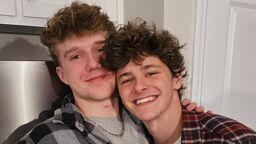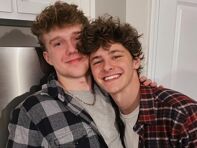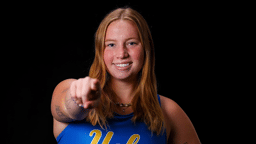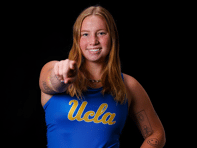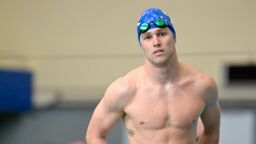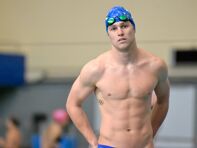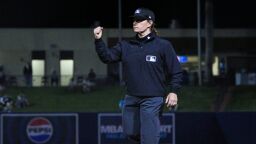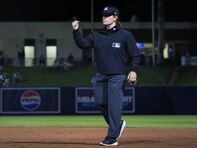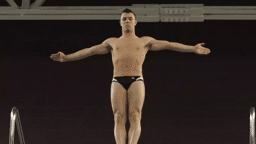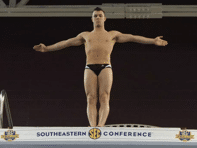One of the happiest moments of my life came at a random high school swim meet in December 2020.
It wasn’t even a meet we won. But it was the first meet after I had come out, and just being able to be myself was enough. I knew I wasn’t alone anymore. Coming out was both the dumbest thing I ever did and the scariest thing I ever did. But I’ll get to that later.
I’m from the suburbs of Rochester, New York. Not the best environment for a queer teenager, but definitely not the worst either. However, high school sports teams are pretty much the most anti-queer spaces I can think of.
Homophobic jokes and even slurs are commonplace. Far from the most accepting environment for a nonbinary kid struggling with their identity (nonbinary people identify as outside the gender binary, neither male nor female). But I made it work.
For more than 17 years, I was never really concerned about my identity. I’m not sure if it was denial or just plain ignorance, and I don’t think I’ll ever know. I just never really thought about it. I should have seen it sooner.
I’d never gotten along very well with most of the athletes at my high school or even at my club team — I tolerated them. I became friends with a few of them, but my true friends were always the LGBTQ athletes. I never sought them out, we just happened to find each other. Even, in some cases, when neither of us knew we were LGBTQ at the time. I suppose you could call it gaydar. And yet somehow, I still missed all the signs.
Then COVID-19 happened. I didn’t have any of the distractions I always had. I couldn’t swim for months. This caused my mental health to take a nosedive, but it also gave me a lot more time to contemplate things.
I finally started to see all of the signs that I had missed for the past 17 years. It happened slowly at first, but after a month or two of struggling I finally decided to reach out to a few of my queer friends. With their help and advice, I started becoming more comfortable with the fact that I was nonbinary.
But realizing I was nonbinary was only a small part of the battle. By far the biggest part was coming out. Of course, I started with close friends I knew would be accepting. I wasn’t planning on coming out publicly until I was at college and didn’t have to worry about how my parents would react.
But my mental health threw a wrench in my plans. The summer of 2020 was a low point in my life. I felt alone, depressed, and didn’t feel safe coming out. Every time I felt like I had hit rock bottom, things somehow got even worse.
My breaking point was when my dad yelled at me one night for making too many Pride-related social media posts. Of course, he didn’t know I was nonbinary, neither did most people following me; they just thought I was an ally. That didn’t make it hurt any less, though. This was where I truly hit rock bottom. I wasn’t quite suicidal, but I knew if things didn’t change I would be soon.

The first story of my coming out was the story of the dumbest thing I ever did. It was November 2020, about a week before my senior season of swim started. I was in class when my phone started buzzing. My team’s groupchat had started a conversation.
This wasn’t unusual. It happened almost daily. However, when I saw one of the messages my heart sank. It was one word. “Fag.” I knew it was a joke, I knew it wasn’t directed to me, but it still hurt. This was far from the first time this had happened, and I had confronted them several times about it. They always stopped for a few weeks, and then started again. I was sick of it. I knew what I had to do to stop it. I knew I had to come out to them.
Later that night, I sent a message to the group saying that as someone who was in the LGBTQ community, it hurt to hear a teammate use a word like that. I poured my heart out. I was sick of hearing my friends use slurs like that. The teammate who used the slur apologized to me.
I had made my teammates less homophobic by coming out to them.
Nobody else said anything. Nobody noticed my comment about being part of the LGBTQ community. You could cut the tension in the chat with a knife. After 15 minutes, I couldn’t take it anymore and told them bluntly that I was trying to come out to them. Finally, people responded. It was a mix of lighthearted jokes and congratulations. There were a few good questions asked too; it seemed they legitimately cared and wanted to learn. I couldn’t have asked for a better response. The dumbest thing I had ever done had actually worked. I had made my teammates less homophobic by coming out to them.
Coming out to my teammates was only a small part of the battle. I was still far too terrified to come out completely. The biggest obstacles were my parents. But I had one goal. I wanted to come out by the end of 2020. My mom has always been the more progressive of my parents, so coming out to her wasn’t too difficult. After a particularly rough day I broke down and told her everything.

However, coming out to my dad was going to be much more challenging. It took me several weeks to work up the courage to do it. Finally, I picked a day, and I told myself I was going to do it that day. I picked Dec. 27. As the day passed, I started to have my doubts. I was so anxious that I felt sick. Finally, at 10:30 p.m., I worked up the courage to tell him. It didn’t go well. But it was done. I had finally cleared my last obstacle to coming out.
A few days later, I did the scariest thing I had ever done. I put on my Pride shirt, took a quick selfie, and wrote up a few paragraphs talking about my struggles and my identity, and thanking my friends for being so supportive. I posted it quickly on Instagram, before I had time to overthink and chicken out. Immediately, comments started pouring in. The amount of supportive comments and congratulations from close friends, acquaintances, even some people I hadn’t spoken to in months or years, was incredible. My dad wasn’t happy, but I didn’t care.
Now, back to the swim meet I was talking about in the beginning. This meet was against Hilton High School, who we had a friendly rivalry with. I was friends with a few people on the team. I wasn’t sure how they would react and I knew none of them had commented on my coming out.
This meet was the day after I had made my post. I was still a nervous wreck. Even though I had already come out, for some reason, I was terrified of what people would say. Nobody said anything to me when we walked into the pool. Nobody said anything to me during warmup. Nobody said anything to me after warmup. Finally, it was time for my first event. I was still incredibly anxious. I wasn’t focused on my race at all. Then, one of the happiest moments of my life happened.
I don’t think he knows what it meant to me, at least, not until now. Jared Enser, one of Hilton’s captains and an acquaintance of mine, walked over to me. He put his fist out for a fist-bump and said something along the lines of, “Congrats dude, I saw your post. I know that had to be hard.” I thanked him.
Instantly, all of my nervousness was gone. Jared still kicked my ass in that race, but I wasn’t scared anymore. I didn’t feel alone anymore. It was like a two-ton weight was lifted off my shoulders. Or, maybe a more apt analogy, I didn’t feel like I was drowning anymore. It was a small thing, only two sentences, but it was one of the best moments of my life.
Jordan Fixsen, 17, will graduate from Penfield High School in New York in the summer of 2021. They are a member of the school’s swimming and outdoor track teams. They plan to study mechanical engineering in college. They can be reached at [email protected], or on Instagram or Twitter.
Story editor: Jim Buzinski
If you are an out LGBTQ person in sports and want to tell your story, email Jim ([email protected])
Check out our archive of coming out stories.
If you’re an LGBTQ person in sports looking to connect with others in the community, head over to GO! Space to meet and interact with other LGBTQ athletes, or to Equality Coaching Alliance to find other coaches, administrators and other non-athletes in sports.
If you are considering suicide, LGBTQ youth (ages 24 and younger) can reach the Trevor Project Lifeline at 1-866-488-7386. Adults can contact the National Suicide Prevention Lifeline at 1-800-273-8255 24 hours a day, and it’s available to people of all ages and identities. Trans or gender-nonconforming people can reach Trans Lifeline at 877-565-8860.





